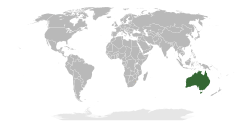Ostralya
Appearance
(Naredirek gikan sa Australya)
| Nasodnong Awit: Advance Australia Fair N1 | |
 | |
| Kapital | Canberra 35°18′ S 149°08′ E |
| Kinadak-ang dakbayan | Sydney |
| Opisyal nga (mga) pinulongan | Ingles (de facto N2) |
| Gobyerno | Parliamentary democracy (federal constitutional monarchy) |
| - Monarch | Queen Elizabeth II |
| - Governor-General | Sir Peter Cosgrove |
| - Prime Minister | Malcolm Turnbull |
| Independence | from the United Kingdom |
| - Constitution | 1 January 1901 |
| - Statute of Westminster | 11 December 1931 (adopted 9 September 1939) |
| - Australia Act | 3 March 1986 |
| Arya | |
| - Katibuk-an | 7,741,220 km² (6th) |
| 2,988,888 sq mi | |
| Populasyon | |
| - 2007 | 21,050,000[1] (53rd) |
| - Sensus sa 2006 | 19,855,288 |
| - Densidad | 2.6/km² (224th) 6.7/sq mi |
| GDP (PPP) | Banabana sa 2007 |
| - Katibuk-an | US$718.4 billion (IMF) (17th) |
| - Per capita | US$34,359 (IMF) (14th) |
| HDI (2004) | 0.957 (3rd) – high |
| Kwarta | Australian dollar (AUD)
|
| Sona sa oras | various N3 (UTC+8 to +10.5) |
| - Summer (DST) | various N3 (UTC+8 to +11.5) |
| Internet TLD | .au |
| Kodigong pangtawag | +61
|
Ang Komonwelt sa Ostralya usa sa mga nasod sa Habagatang Hemisper. Kini gitibuok sa kontinente sa samang ngalan ug sa pipila ka pulo sa Habagatang Kadagatan, Kadagatang Indiyan ug Kadatang Pasipiko. Silingan sa Australya ang mga nasod nga Papua New Guinea, Sidlakang Timor, Indonesia, New Zealand, Solomon Islands, Vanuatu, ug New Caledonia.
Mga may kalabotang topiko
Dugang Impormasyon
- Gillespie, R. (2002). Dating the first Australians. Radiocarbon 44:455-472
- Smith, L. (1980), The Aboriginal Population of Australia, Australian National University Press, Canberra
- Tatz, C. (1999). Genocide in Australia Archived 2015-02-24 at the Wayback Machine, AIATSIS Research Discussion Papers No 8, Australian Institute of Aboriginal and Torres Strait Islander Studies, Canberra
- Windschuttle, K. (2001). The Fabrication of Aboriginal History, The New Criterion Vol. 20, No. 1, September 20.
- Bean, C. Ed. (1941). Volume I - The Story of Anzac: the first phase Archived 2008-08-28 at the Wayback Machine, First World War Official Histories 11th Edition.
- Australian Electoral Commission (2000). 1999 Referendum Reports and Statistics
- Parliamentary Library (1997). The Reserve Powers of the Governor-General Archived 2010-07-26 at the Wayback Machine
- Australian Government. (2005). Budget 2005-2006
- Department of the Environment and Heritage. About Biodiversity
- Macfarlane, I. J. (1998). Australian Monetary Policy in the Last Quarter of the Twentieth Century. Reserve Bank of Australia Bulletin, October
- Parham, D. (2002). Microeconomic reforms and the revival in Australia’s growth in productivity and living standards. Conference of Economists, Adelaide, 1 October
- Australian Bureau of Statistics. Labour Force Australia. Cat#6202
- Australian Bureau of Statistics. Year Book Australia 2005
- Department of Foreign Affairs and Trade (2003). Advancing the National Interest, Appenidix 1
- Australian Bureau of Statistics, Population Growth - Australia’s Population Growth
- Department of Immigration, Multicultural and Indigenous Affiars. (2005). The Evolution of Australia's Multicultural Policy Archived 2006-02-19 at the Wayback Machine
- Australian Bureau of Statistics. 2001 Census, A Snapshot of Australia Archived 2007-10-01 at the Wayback Machine
- Parliament of Australia, Senate (2005). Inquiry into Australian Expatriates Archived 2008-07-08 at the Wayback Machine
- NCLS releases latest estimates of church attendance, National Church Life Survey, Media release, 28 February 2004
- Australian Film Commission. What are Australians Watching?, Free-to-Air, 1999-2004 TV Archived 2006-11-29 at the Wayback Machine
Mga sumpay sa gawas
![]() Ang medya nga may kalabotan sa Ostralya sa Wikimedia Commons
Ang medya nga may kalabotan sa Ostralya sa Wikimedia Commons
- Giya sa pagbiyahe sa Australia gikan sa Wikivoyage
- Australian Government Entry Portal
- Australian Government Online
- DFAT: Country Information Archived 2005-01-10 at the Wayback Machine
- Satellite images of Australia (Google Maps)
- National Library of Australia
- National Museum of Australia
- Official Australia Tourism Website
- Bureau of Meteorology
- Australia Network tv channel (cable & satellite) (Ininglis)


